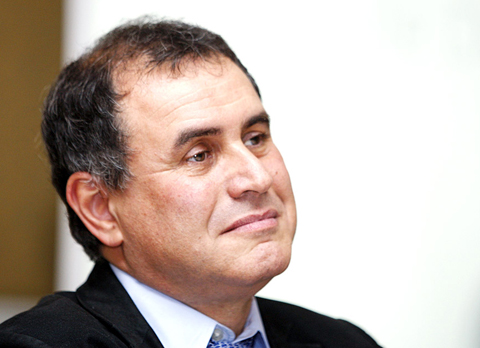Nouriel Roubini, one of the few economists who accurately predicted the magnitude of the financial crisis, said on Thursday that the worst of the turmoil had passed.
But Roubini emphasized the US would still need a second fiscal stimulus, possibly by the end of the year, as the unemployment rate quickly approaches 10 percent.
Developed economies are bottoming out or close to doing so, but the recovery will be anemic, with the US remaining in recession throughout the year, said Roubini, who is chairman of RGE Global Monitor.

PHOTO: REUTERS
“There is light at the end of the tunnel, there is a bottoming out of the US and of the global economy. And the light at the end of the tunnel for once is not an incoming train,” Roubini told investors at an event organized by the Chilean government in New York. “In many ways, the worst is behind us in terms of economic and financial conditions.”
During the event, Roubini said US labor markets would continue to deteriorate until the end of the year, forcing the government to deliver a second fiscal stimulus that could be in the range of US$200 billion to US$250 billion.
The economist expects US unemployment to top 10 percent by the end of the year, weighing on domestic consumption and the retail sector.
“I think we may need, in fact, a fiscal stimulus some time early next year or before the end of this year,” he told reporters after delivering a speech at the event.
“It might be in the US$200 [billion] to US$250 billion range — not too small, not too big,” he added.
Asked about the economic impact of a potential collapse of embattled US lender CIT Group, Roubini said the company should be allowed to go bankrupt if it is insolvent.
“I don’t think it can have systemic effects such as Lehman [Brothers],” he said, adding, however, that other institutions would need to step up to ensure credit continues to flow appropriately to small and medium-sized companies.
While developing economies in general will have a sub-par recovery during the next couple of years, emerging countries are in better shape to exit the recession faster, Roubini said.
After 10 years of sound macroeconomic policies and reduction in public debt levels, he said, many emerging economies were able to implement counter-cyclical policies for the first time, which will result in faster economic recovery.
“Today people are worrying more about sovereign risk in advanced economies than in emerging markets,” Roubini said, calling it a “shift in paradigm.”

MORE VISITORS: The Tourism Administration said that it is seeing positive prospects in its efforts to expand the tourism market in North America and Europe Taiwan has been ranked as the cheapest place in the world to travel to this year, based on a list recommended by NerdWallet. The San Francisco-based personal finance company said that Taiwan topped the list of 16 nations it chose for budget travelers because US tourists do not need visas and travelers can easily have a good meal for less than US$10. A bus ride in Taipei costs just under US$0.50, while subway rides start at US$0.60, the firm said, adding that public transportation in Taiwan is easy to navigate. The firm also called Taiwan a “food lover’s paradise,” citing inexpensive breakfast stalls

TRADE: A mandatory declaration of origin for manufactured goods bound for the US is to take effect on May 7 to block China from exploiting Taiwan’s trade channels All products manufactured in Taiwan and exported to the US must include a signed declaration of origin starting on May 7, the Bureau of Foreign Trade announced yesterday. US President Donald Trump on April 2 imposed a 32 percent tariff on imports from Taiwan, but one week later announced a 90-day pause on its implementation. However, a universal 10 percent tariff was immediately applied to most imports from around the world. On April 12, the Trump administration further exempted computers, smartphones and semiconductors from the new tariffs. In response, President William Lai’s (賴清德) administration has introduced a series of countermeasures to support affected

CROSS-STRAIT: The vast majority of Taiwanese support maintaining the ‘status quo,’ while concern is rising about Beijing’s influence operations More than eight out of 10 Taiwanese reject Beijing’s “one country, two systems” framework for cross-strait relations, according to a survey released by the Mainland Affairs Council (MAC) on Thursday. The MAC’s latest quarterly survey found that 84.4 percent of respondents opposed Beijing’s “one country, two systems” formula for handling cross-strait relations — a figure consistent with past polling. Over the past three years, opposition to the framework has remained high, ranging from a low of 83.6 percent in April 2023 to a peak of 89.6 percent in April last year. In the most recent poll, 82.5 percent also rejected China’s

PLUGGING HOLES: The amendments would bring the legislation in line with systems found in other countries such as Japan and the US, Legislator Chen Kuan-ting said Democratic Progressive Party (DPP) Legislator Chen Kuan-ting (陳冠廷) has proposed amending national security legislation amid a spate of espionage cases. Potential gaps in security vetting procedures for personnel with access to sensitive information prompted him to propose the amendments, which would introduce changes to Article 14 of the Classified National Security Information Protection Act (國家機密保護法), Chen said yesterday. The proposal, which aims to enhance interagency vetting procedures and reduce the risk of classified information leaks, would establish a comprehensive security clearance system in Taiwan, he said. The amendment would require character and loyalty checks for civil servants and intelligence personnel prior to